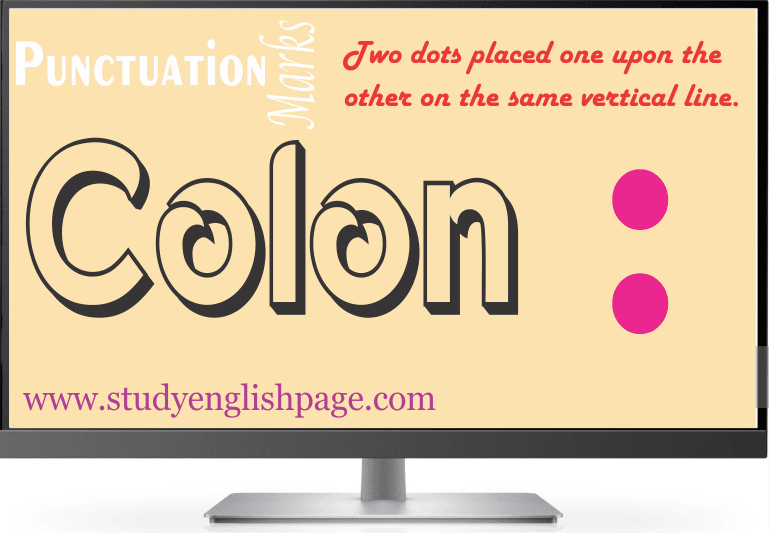What is a Colon?
Colon (:)
Colon is one of the punctuation marks having two dots placed one upon the other on the same vertical line. It is used in different ways as discussed below.

- Dear sir:
- 5:15 p.m.
- New York, NY: Wiley. St. Louis, MO: Mosby.
- They did what they worked for: they started their own business.
- You have to bring the following things: chickens, soft drinks, and bread.
Uses of Colons
To Introduce an Item or Series of Items
Generally, a colon is used to introduce an item or series of items.
It means when we have an item or series of items, we use a colon before the item or
series and after the earlier part of the series.
- You have to bring the following things: chickens, soft drinks, and bread.
- These are what I can do: composing, article writing, designing, and editing.
List Directly Follows Verbs
If we have a list that directly follows the verb, we avoid
using a colon.
- I studied Math, English, and Geography.
- I studied: Math, English, and Geography. Incorrect
Prepositions that Need No Punctuation
We don’t need to use a colon after a preposition. It means that
when a colon follows any prepositions, we don’t use a colon.
- He excelled in content writing, story writing, and editing.
- He excelled in: content writing, story writing, and editing. Incorrect
Listing items one per line
When we have single
words, phrases, or sentences that follow letters, numbers, or bullet points,
using capitalization and ending punctuation are optional. If we have a complete
sentence in each point, then we capitalize the first letter and punctuate the
ending.
- I need an employee who can do these:
ü write reports
ü communicate well
ü speak English
- You have to follow these rules:
ü You must have a proper dress.
ü You must have a registration card.
ü You have to stay for three days.
Between Independent Clauses
When we have two independent clauses and the second clause
explains, illustrates, or paraphrases the first clause, we use a colon instead of
a semicolon.
- They did what they worked for: they started their own business.
Quotations having more sentences
Many writers use a colon before starting the quotation marks if
there are more sentences.
- He said: “You must study hard. You must be punctual. You must have a fun time too.”
In Extended Quotations
When we have extended quotations, then we don’t use quotation
marks. Some writers suggest indent on both margins. Some writers suggest just a left margin.
- The author of Understanding And Using English Grammar wrote in his book:
The simple present tense says that something was true in the past, is true in the present, and will be true in the future. It expresses general statements of fact and general truths.
In References
References are used to give information about the original
sources. Colons are also used in references to separate publication places from the publisher.
- New York, NY: Wiley. St. Louis, MO: Mosby.
- Ozeki, R. (2013) A tale for the time being. New York: Penguin Books.
In Titles
Generally, we use a colon to separate the title from its subtitle. When a title is followed by a subtitle, we use a colon to separate it. When there are two
subtitles, then two colons are used to separate the titles.
- The East End: The story of a Neighborhood
After Salutation
Colon is used after salutation especially in business letters
even if someone is addressed directly by his or her name.
- Dear sir:
- Dear John:
In writing time
Colon is used when we write time in digital form. We use a colon
to separate hours, minutes, and seconds.
- 5:15 p.m.
- 5:15:30 p.m.
In Ratio
We use a colon to express
a ratio of two numbers. We don’t use space after or before the colon.
- The ratio of the male to the female in the class is 1:3
Capitalization after Colon
v You
don’t need to capitalize the first letter that comes just after a colon. If there
is a proper noun, then you can write the first letter in capital.
·
I spent and worked a lot
for what I had in my dreams: a good
job.
·
She got whom she had in her
dreams: Tom has become her husband.
v When
there is a colon between two independent clauses, writers have different
views regarding capitalization. Some writers suggest capitalizing the first word in the second
clause. Others suggest against it. If the second clause is closely related to
the first one, you don’t need to capitalize. If the second clause is a general
or formal statement, many writers capitalize the first word.
·
They got what they worked
for: they received their graduate degrees.
·
You must remember the old
saying: Be careful what you wish for.
v When
a quoted sentence follows a semicolon, capitalize the first letter of the
quoted sentence.
·
They made an announcement: “You have fifteen minutes to have lunch.”
v If
the information includes or requires more than one sentence, the first
word is capitalized.
·
They gave us these
suggestions: You must study hard. You
must be punctual. You must have a fun time too.
